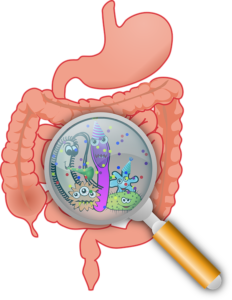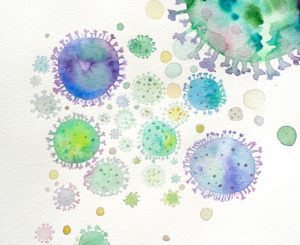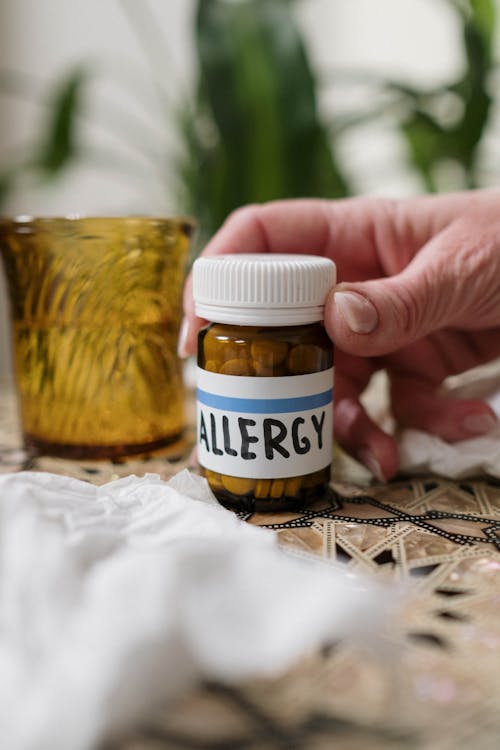ALLERGIES and GUT HEALTH
Do you struggle with allergies when the beauty of Spring is in the air? If your eyes itch when you should be enjoying a sunny, spring day, strange though it may sound, it’s time to heal your gut…
Let me explain…
Allergies occur when your immune system overreacts to something that’s generally harmless, such as pollen or dust mites. This triggers inflammation and produces allergic symptoms. These can range from hay fever (also known as allergic rhinitis), digestive discomfort, eczema, and asthma, to life-threatening anaphylaxis.
While quick-fix medications, such as antihistamines, provide symptomatic relief, targeting the underlying casues of allergy, particularly your gut health and function, can provide long-term health benefits.
Did you know that improving your gut health can increase your tolerance to allergic triggers?
This can help you overcome your allergies and enable you to be outdoors without getting teary, fiery eyeballs.
‘While quick-fix medications, such as antihistamines, provide symptomatic relief, targeting the underlying causes of allergy, particularly your gut health and function, can provide long-term health benefits.’

Let’s see how Gut Health affects Allergies
Your microbiome (i.e. your gut bacteria) is a foundation of good health, especially when it comes to regulating your immune system and reducing its reactivity.
In fact, dysbiosis (an imbalance in the types and levels of gut bacteria) has been identified as a distinctive feature of allergy.
Research has actually identified differences in microbiome composition between people with allergies and those without.
The imbalance in the types and levels of gut bacteria has been shown to promote gut inflammation, which also stimulates inflammation beyond the gut.
This includes the release of histamine (an inflammatory chemical produced by immune cells), which causes many of the symptoms associated with allergies.
Fortunately, you can reduce dysbiosis and improve the composition of your gut bacteria through the use of specific probiotic strains (types of bacteria), which help regulate your immune function to prevent and reduce allergic symptoms.
For instance, the strain Lactobacillus rhamnosus (LGG®) has been shown to increase the production of anti-inflammatory immune cells. These act against allergy-associated inflammation and support healthy immunity.

Enhancing your gut bacteria composition has also been shown to suppress histamine release.
Together, these benefits may reduce immune hyper-reactivity and decrease allergy symptoms.
Gut Inflammation can Trigger a Leaky Gut.
Gut inflammation, caused by dysbiosis, has also been shown to trigger a leaky gut, which occurs when your gut barrier (cells that form a physical barrier between your digestive tract and the rest of your body) becomes permeable or ‘leaky’.
When the gut barrier is damaged, food particles, bacteria, and toxins may be able to enter your bloodstream. This aggravates inflammation and triggers an immune response that worsens your allergy symptoms.
Fortunately, specific herbs and nutrients can help restore a leaky gut barrier. These include:
- Glutamine: An amino acid (a small compound that combines with other amino acids to form protein) that strengthens the integrity of the gut barrier and reduces the passage of contents between your gut and bloodstream.
- Vitamin A: is essential for optimal cell growth and maintenance of the gut barrier, with deficiency of this key nutrient preventing the regeneration of gut barrier cells.
- Zinc: is another essential nutrient that supports the integrity of gut barrier cells, with deficiency increasing the likelihood of leaky gut development.
- Baical skullcap: a herb that has been found to reduce the gaps that form between gut barrier cells (as a consequence of dysbiosis), causing them to become leaky.
- Shiitake mushroom: a medicinal mushroom that regulates immune function and reduces inflammation.
Support Good Digestive Function to Reduce Allergies
Given the strong connection between the health of the gut and immune system, supporting good digestive system function can address some of the underlying factors that cause your immune system to be over-reactive.
The Allergy and Reactivity Reduction Program used at Your Wellness Centre is specially designed to repair your gut and improve your immune tolerance, reducing allergy symptoms.
This approach can help you gain control of your allergies and how your body reacts so that you can once more indulge in the activities that you enjoy.
To find out if the Allergy and Reactivity Reduction Program is right for you, consult with a naturopath at Your Wellness Centre.
‘Given the strong connection between the health of the gut and immune reactivity, supporting good digestive system function can address some of the underlying factors that cause your immune system to be over-reactive.’
Overcoming Allergies
If your nose has done more running during springtime than you have, perhaps it’s time to consider an allergy plan with long-term health benefits.
Maintaining a healthy gut is key to supporting your immune function and building tolerance to allergic triggers, and is therefore central to providing a lasting solution to allergic conditions.

For guidance on how best to improve your allergies, speak with a naturopath at Your Wellness Centre to see how we can help you in your journey to wellness.





 While allergy and asthma appear to be caused by outside triggers, such as dust, pollen, dry air and stressful events, the underlying problem actually lies within us. Both allergy and asthma occur when a particular part of our immune system is out of balance. Our immune system is designed to protect us from infections and to keep us healthy. An allergy occurs when your immune system mistakes something that is normally harmless as being a threat to you and while “protecting” you from it, creates a strong inflammatory response. This inflammatory response is what produces the symptoms that you experience allergies. In asthma, this inflammation presents as difficulty breathing or may trigger an asthma attack.
While allergy and asthma appear to be caused by outside triggers, such as dust, pollen, dry air and stressful events, the underlying problem actually lies within us. Both allergy and asthma occur when a particular part of our immune system is out of balance. Our immune system is designed to protect us from infections and to keep us healthy. An allergy occurs when your immune system mistakes something that is normally harmless as being a threat to you and while “protecting” you from it, creates a strong inflammatory response. This inflammatory response is what produces the symptoms that you experience allergies. In asthma, this inflammation presents as difficulty breathing or may trigger an asthma attack. So whether you need help with occasional hayfever or suffer from persistent asthma or irritating dermatitis, we have the formula to help you. As your Healthcare Professional, I have the experience and skills to prescribe the most suitable treatment for your needs and help you to understand how to achieve your health potential. Call today to
So whether you need help with occasional hayfever or suffer from persistent asthma or irritating dermatitis, we have the formula to help you. As your Healthcare Professional, I have the experience and skills to prescribe the most suitable treatment for your needs and help you to understand how to achieve your health potential. Call today to 